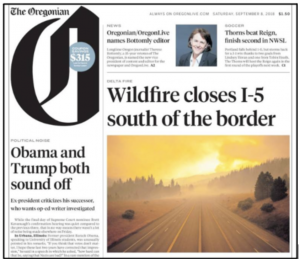2 Reading Skills 1
Davina Ramirez
Learning Objectives
Reading Skills
- Identify 12 reading skills
- Identify times you have already used specific reading skills
- Identify purposes and qualities of self-reflective writing
- Write a short self-reflection
Title Format
- Understand academic conventions for formatting titles of sources
- Understand how to mention the title of a source in academic writing
- Capitalize titles correctly
- Use italics or quotation marks to format titles correctly
Reading Skills Self-Assessment
Here is a list of 12 different reading skills. Choose the statement that best describes your understanding and ability in these reading skills. If you don’t recognize or understand a skill, just choose “I don’t know.” Be honest with yourself, and don’t worry!
_______________
Skill Description
Now that you have an idea of your own strong and weak areas, choose a few skills to learn more about. You will see a list of sentences after each skill. Choose the true sentences. When you’re done, you will see a short summary of the skill, how to use it, and when when to use it.
Skill 1: Guessing Vocabulary from Context
Skill 2: Identifying Main Ideas
Skill 3:Identifying Supporting Details
Skill 4: Identifying Implied Main Ideas
Skill 5: Understanding How Transitions Create Relationships Between Ideas
Skill 6: Making Inferences
Skill 7: Understanding Purpose and Tone
Skill 8: Identifying Arguments
Skill 9: Critical Reading
Skill 10: Recognizing Figurative Language
Skill 11: Recognizing Themes
Skill 12: Recognizing Symbols
You can come back to these summaries again to review the skills. As you practice using the skills, your understanding will keep developing and improving. It takes years to master all these skills, so plan to give yourself time!
Self-Reflection

What Is Self-Reflection?
Metaphorically, self-reflection is when you look in a mirror to see yourself clearly. We do this all the time in our lives. We ask ourselves: “Why did I do that? Why did I feel that way? What did I learn from this? What will I do the same or differently next time?” As learners, it’s important to ask ourselves these types of questions about our learning, too. Why? So we know what works well for us, what we struggle with, and how to improve going forward. Self-reflection helps us know how to apply our learning to other classes, to our jobs and other aspects of our lives, and to the world.
Try It:
Identify if each short passage is self-reflective writing or not.
Your Goal: Self-Reflection Assignment 1
Write two paragraphs reflecting about yourself as a reader in English. The topic of this assignment is you and your learning. You can write this paper as a letter to yourself, to me, or to someone else – maybe your child, or maybe to yourself ten years in the future. There is no specific length, but you should try to answer the prompts fully. Don’t worry about answering EVERY part of each question. You may answer in any order you like.
You don’t need to have a thesis statement, but you DO need focused paragraphs and clear topic sentences. Focus each paragraph on one question area. Give examples based on our readings, but don’t try to mention every skill or reading we did this term. Focus on those that resonated with you.
If you discuss a specific reading, state the title of the reading, correctly formatted. If you include any quotations, use quotation marks and give the page number if available.
Formatting Titles of Sources Correctly
We read for many reasons, including for fun, to do tasks correctly, and to think about the “big questions” of life and morality. In college, one of the most important — and most common! — reasons you read is to find support for your own ideas. You might be trying to prove that your theories are correct, adding to the ways we understand a great piece of art, or sharing your unique experiences in life. In all these cases, you will communicate your beliefs, claims or experiences to other people either in writing or speaking, and you will want as much support as you can find. These pieces of support all come from sources. And, if your source has a title (like an article, story, poem, movie or song), you must share that title with your readers or listeners.
Remember these facts:
- A source is anything that gives you information
- Sources can be people, songs, movies, articles, books, TV shows, websites, and much more
- When you use a source in academic writing or speaking, you must give the title and author of the source
- There are special rules about the format of titles you mention this way
- These rules do not apply to topics or main ideas — only titles
- These rules do not apply to the titles of your own writing — only to titles of sources
Example 1: NewspaperThe name of the newspaper is The Oregonian. Use italics when typing. If you write by hand, underline The Oregonian. The title of the main story is “Wildfire Closes I-5 South of the Border.” Newspapers have their own capitalization rules, but a college writer needs to follow college writing rules. |
|
Example 2: MagazineThe name of the magazine is Newsweek. Use italics when typing. If you write by hand, underline Newsweek. The title of the cover story is “The Nixon Tapes.” |
 |
Try the video exercise that explains these rules. If you can answer all the questions correctly, go on to the Title Format Exercise.
Video Quiz Link: https://pcc.h5p.com/
Title Format Exercise 1
Correct these sentences. Don’t change ANYTHING except capitalization and format. Hint: Every one of these titles is a real title of a real source. You can check each one online to understand what kind of source it is – and maybe even see the correct format!
- Alison Bechdel wrote and illustrated the graphic novel fun home.
- Bechdel also wrote a book about her mother, titled are you my mother?
- Ray Bradbury’s great short story all summer in a day was published in 1954.
- Perhaps the most popular science fiction magazine of the 1940’s and 1950’s was called the magazine of fantasy and science fiction.
- Haruki Murakami is primarily a novelist, but his story barn burning is popular.
- Barn burning appeared in the book the elephant vanishes.
- John Steinbeck wrote the novel of mice and men as well as the novella the pearl.
- The magazine time published several articles about Steinbeck during his life.
- The magazine newsweek is now only available online.
- Two of the most important American newspapers right now are the washington post and the new york times.


